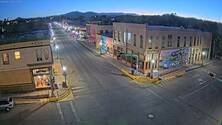Here’s a look at today’s headlines:
The Gaffney-Oglesby Marine Corps League and the American Legion hosted a picnic for veterans on Saturday at Gomez Peak picnic area. All veterans were invited to attend. Also in attendance was Law Enforcement Explorer Post 883, brought to the picnic by Border Patrol Agent Lionel Reyes, post advisor. The Explorer Post is a career track, hands-on experience for 14-20 year-olds, and includes posts all over the nation including in Lordsburg, Silver and Cobre school districts.
On Monday, U.S. Senators Tom Udall and Martin Heinrich announced that New Mexico State University (NMSU) will receive more than $4.4 million to support research on pecan genetics and breeding that will help New Mexico pecan farmers improve the sustainability and profitability of their crops. The funding was awarded through the U.S. Department of Agriculture’s (USDA) National Institute of Food and Agriculture Specialty Crop Research Initiative, authorized by the 2014 Farm Bill, which Udall and Heinrich supported. The funded research will allow for the development of genetic tools that will help farmers select varieties of trees that will thrive in the varying growing conditions of different regions.
Tomorrow, the New Mexico Public Regulation Commission (PRC) will be holding a public hearing to consider the Application of New Mexico Public Service Company (PNM) regarding approval of a Special Services Contract and Advice Notice for a potential new customer, Facebook, Inc. If approved the proposal would put New Mexico in the running with Utah for consideration of Facebook’s next data center. If located here, the project will create additional jobs for the State of New Mexico while increasing tax revenue.
Final federal approval for what is being called the “new Keystone” came from the Army Corps of Engineers on July 26—allowing the pipeline to move forward. The 1,168-mile long Dakota Access Pipeline (DAPL), also called the Bakken Pipeline, is comparable in length to the Keystone XL. It will cross four states and carry 450,000 barrels of oil a day from North Dakota to a transfer terminal in Illinois where it will connect with other pipelines and be taken to refineries.


